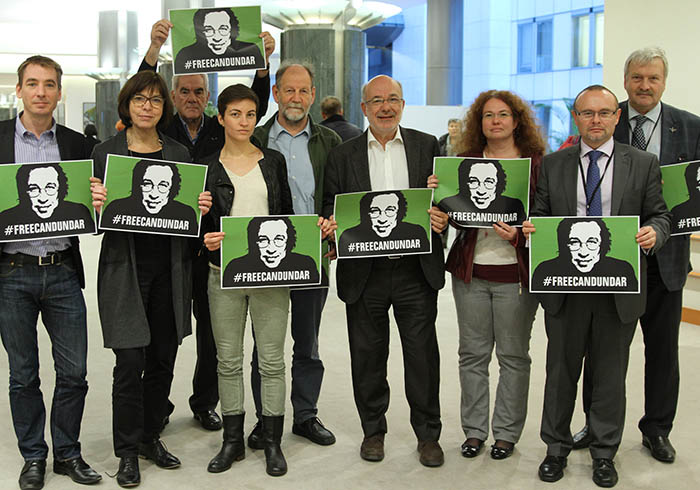Index relies entirely on the support of donors and readers to do its work.
Help us keep amplifying censored voices today.
The years of 2016 and 2017 have taught us, if nothing else, that the news we write, as much as the news we withhold, can distort the way readers perceive reality, with long-lasting consequences. But who decides what truth should be told? Read in full.
[vc_row][vc_column][vc_single_image image=”100566″ img_size=”full”][vc_row_inner][vc_column_inner width=”1/3″][vc_single_image image=”74586″ img_size=”full”][/vc_column_inner][vc_column_inner width=”1/3″][vc_single_image image=”88957″ img_size=”full”][/vc_column_inner][vc_column_inner width=”1/3″][vc_single_image image=”100560″ img_size=”full”][/vc_column_inner][/vc_row_inner][vc_column_text]International human rights lawyers Doughty Street Chambers have lodged a complaint to the United Nations on behalf of Egyptian campaigner Amal Fathy, her husband and their son after the family was seized by police.
Ms Fathy and her husband Mohamed Lotfy, co-founder of award-winning human rights group the Egyptian Commission for Rights and Freedoms, were arrested by police in the early hours of May 11. Their Cairo apartment was raided by armed police, searched and Ms Fathy, Mr Lotfy and their two year-old son Zidane taken to a police station.
Mr Lotfy and Zidane were released several hours later but Ms Fathy remains in custody. The trigger for the arrests was said at the time to be a short 12-minute Facebook video posted by Ms Fathy in which she complained about having been sexually harassed at a bank and the difficulties of being a woman in Egypt. Ms Fathy has since been charged with membership of a terrorist organisation.
“Unfortunately, the case of Mr Lotfy, his son, and Ms Fathy, are not isolated, nor in many ways surprising,” said Caoilfhionn Gallagher QC, one of the lawyers acting for the family. “Over the past several years, many Egyptian human rights defenders, bloggers and journalists have been subjected to state harassment, disproportionate police and judicial treatment, and arbitrary curtailment of their most fundamental rights.”
Ms Fathy is a communications student and former activist and actress who is active on social media, especially Facebook, where she advocates and expresses her views on ongoing issues in Egypt especially on women’s rights.
Mr Lotfy leads the Egyptian Commission for Rights and Freedoms, which coordinates campaigns for those who have been tortured or disappeared. Between August 2016 and August 2017, the ECRF documented 378 cases of enforced disappearance, many of them concerning students.
Caoilfhionn Gallagher QC and Jonathan Price of Doughty Street Chambers have submitted their complaint on the treatment of Mr Lotfy and his son, and the continued detention of Ms Fathy, to the UN rapporteurs on freedom of expression and human rights defenders. The complaint has been lodged jointly with ECRF and freedom of expression organisation Index on Censorship, which in April awarded ECRF one of its Freedom of Expression Awards Fellowships.
“We have grave concerns given the inevitable lack of due process for Ms Fathy. We also have serious concerns for her wellbeing given the likelihood of prolonged detention, away from her young son, and for the wellbeing of Zidane himself, removed from his primary carer,” said Index on Censorship CEO Jodie Ginsberg.
Egypt has seen an escalation in violence against women and prominent women human rights defenders and activists are routinely harassed and silenced by the authorities. A 2017 poll named Cairo as the most dangerous major city for women.
The organisations have asked the rapporteurs to:
For more information, please contact Joy Hyvarinen at Index on Censorship: [email protected]. [/vc_column_text][vc_separator][/vc_column][/vc_row][vc_row][vc_column width=”1/2″][vc_single_image image=”97988″ img_size=”full” onclick=”custom_link” link=”https://www.indexoncensorship.org/2018/04/campaigning-fellow-2018/”][/vc_column][vc_column width=”1/2″][vc_column_text]
Egyptian Commission for Rights and Freedoms
ECRF is one of the few human rights organisations still operating in a country which has waged an orchestrated campaign against independent civil society groups. Find out more about the 2018 Freedom of Expression Awards Campaigning Fellow.
[/vc_column_text][/vc_column][/vc_row][vc_row][vc_column][vc_basic_grid post_type=”post” max_items=”12″ style=”load-more” items_per_page=”4″ element_width=”6″ grid_id=”vc_gid:1545209658751-e048b322-11bd-8″ taxonomies=”24135″][/vc_column][/vc_row]
[vc_row][vc_column][vc_custom_heading text=”Canan Coşkun, periodista en el diario Cumhuriyet, se enfrenta a dos juicios por su trabajo periodístico. Nos habla de su actitud frente a los peligros de la vida como reportera en Turquía”][/vc_column][/vc_row][vc_row][vc_column][vc_column_text]
El Grupo Green / EFA campaña por la liberación del periodista Can Dundar que después de su reportaje sobre transportes de armas en Turquía fue encarcelado. Crédito: Rebecca Harms / Flickr[/vc_column_text][/vc_column][/vc_row][vc_row][vc_column][vc_column_text]
[/vc_column_text][/vc_column][/vc_row][vc_row][vc_column][vc_column_text]
[/vc_column_text][/vc_column][/vc_row][vc_row][vc_column width=”1/3″][vc_custom_heading text=”Subscribe”][vc_column_text]In print, online. In your mailbox, on your iPad.
Subscription options from £18 or just £1.49 in the App Store for a digital issue.
Every subscriber helps support Index on Censorship’s projects around the world.
![]() SUBSCRIBE NOW[/vc_column_text][/vc_column][vc_column width=”1/3″][vc_custom_heading text=”Listen”][vc_column_text]Historian Rana Mitter talks about China’s current historical narrative, broadcaster Bettany Hughes discusses how memory affects history and Omar Mohammed talks on the dangers of recording history under Isis in this Index magazine podcast.[/vc_column_text][/vc_column][vc_column width=”1/3″][vc_custom_heading text=”Read”][vc_column_text]Through a range of in-depth reporting, interviews and illustrations, the spring 2018 Index on Censorship magazine explores how history is being abused by countries and groups around the world.
SUBSCRIBE NOW[/vc_column_text][/vc_column][vc_column width=”1/3″][vc_custom_heading text=”Listen”][vc_column_text]Historian Rana Mitter talks about China’s current historical narrative, broadcaster Bettany Hughes discusses how memory affects history and Omar Mohammed talks on the dangers of recording history under Isis in this Index magazine podcast.[/vc_column_text][/vc_column][vc_column width=”1/3″][vc_custom_heading text=”Read”][vc_column_text]Through a range of in-depth reporting, interviews and illustrations, the spring 2018 Index on Censorship magazine explores how history is being abused by countries and groups around the world.
With: Neil Oliver, Louisa Lim, Simon Callow[/vc_column_text][/vc_column][/vc_row]
La escasez de papel de periódico en Venezuela ha obligado a algunos periódicos a cerrar, pero los medios digitales se están expandiendo con rapidez para ocupar su lugar y mantener a la gente al tanto de las últimas noticias. Luis Carlos Díaz informa desde Caracas. Read in full.